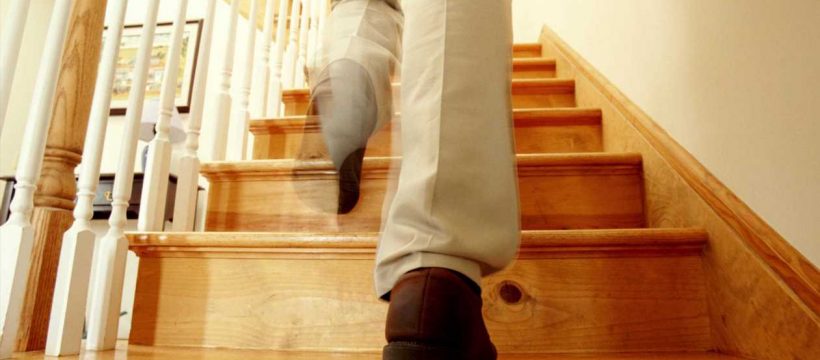THIS simple test could predict your risk of the UK’s biggest killer, experts have found.
Research states that walking up the stairs could help you detect heart disease – which kills one in four Brits every year.
The British Heart Foundation suggests that more than a quarter of all deaths in the UK are down to heart disease.
Data shows that this equates to 460 deaths each day or one every three minutes.
Experts at University Hospital A Coruna in Spain said being able to walk up four flights of stairs quickly without stopping shows your heart is in good shape.
Those who can manage the feat in less than a minute have better heart function, they claimed.
Most people use the stairs in their home every day and the experts said the simple activity is officially classed as "vigorous exercise" – and could help prevent a heart attack or stroke.
Climbing the stairs burns more calories per minute than jogging – and improves cardiovascular fitness and muscle strength.
What are heart attack symptoms?
The heart muscle is then robbed of vital oxygenated blood which, if left untreated, can cause the heart muscle to begin to die, but what are the symptoms?
Heart attack symptoms can be difficult to spot for sure, because they can vary from person to person.
The most common signs include:
- chest pain, tightness, heaviness, pain or a burning feeling in your chest
- pain in the arms, neck, jaw, back or stomach
- for some people the pain and tightness will be severe, while for others it will just feel uncomfortable
- sweating
- feeling light-headed
- becoming short of breath
- feeling nauseous or vomiting
Lead author Dr Jesus Peteiro, a cardiologist at University Hospital A Coruna, Spain, said: "The stairs test is an easy way to check your heart health.
"If it takes you more than one-and-a-half minutes to ascend four flights of stairs, your health is suboptimal, and it would be a good idea to consult a doctor."
Dr Peteiro’s team compared the results with those obtained from exercise trials in a laboratory.
The results revealed that you burn one and a half calories for every 10 stairs climbed and one for every 20 steps you go down the stairs.
Dr Peteiro said that the idea behind the test was to find a simple and inexpensive method of assessing heart health.
He added: "This can help physicians prioritise patients for more extensive examinations."
The findings were based on 165 patients with known or suspected coronary artery disease. Those with the illness displayed symptoms such as shortness of breath during exercise and chest pains.
FITNESS FIRST
In order to test their fitness levels they were made to walk or run on a treadmill. The intensity on the machine was increased gradually until the participants were exhausted.
Exercise capacity was measured as metabolic equivalents (METs) – a scale indicating oxygen consumption.
The participants were given a 15-20 minute rest before then being asked to go up 60 stairs at a fast pace – without stopping or running.
The researchers compared the link between METs achieved during the treadmill tests and the time it took to climb the four flights. Participants who managed it in less than 40 to 45 seconds achieved more than 9 to 10 METs.
This is in contrast to patients who took 90 seconds or more scored less than 8 METs. Previous studies have found deaths from cardiovascular disease are three times higher for this group.
In order to show the impact, during the treadmill test, the researchers also generated images of the heart to assess its function during exercise.
If the organ works normally this indicates a low likelihood of coronary artery disease. They then compared the results to the stair climb.
Some 58 percent of those who completed it in more than 90 seconds had abnormal heart function during the treadmill examination.
This compared to just a third (32 per cent) of those who climbed the stairs in less than a minute. Dr Peteiro added the correlation between the stairs time and exercise capacity would be similar in the general population.
A single MET is defined as the amount of oxygen a person consumes, or the energy expended, per unit of body weight during one minute of rest.
STRING TEST
But if climbing up and down the stairs sounds like too much hard work, another team of experts says you can gauge your risk of heart disease by using just a piece of string.
Writing in the journal 'Circulation' experts said that even if you have a health BMI (body mass index) you could still be at increased risk of heart disease.
They say that people with abdominal obesity and excess fat around the body's mid-section and organs have an increased risk of heart disease.
To complete the string test all you need to do is take a piece of string and cut it to the same length as your height.
Next you need to fold it in half, then wrap it around your waist.
If the string meets or overlaps then you are a healthy weight, but if you can't make the ends meet then your visceral fat levels are too high.
Your visceral fat is the fat that sits around your vital organs in your abdomen.
Too much of it can lead to disease like type 2 diabetes, heart disease and cancer.
We pay for your stories!
Do you have a story for The Sun news desk?
Email us at [email protected] or call 02077824104. You can WhatsApp us on 07423 720 250. We pay for videos too. Click here to upload yours
Click here to get The Sun newspaper delivered for FREE for the next six weeks.
Source: Read Full Article

